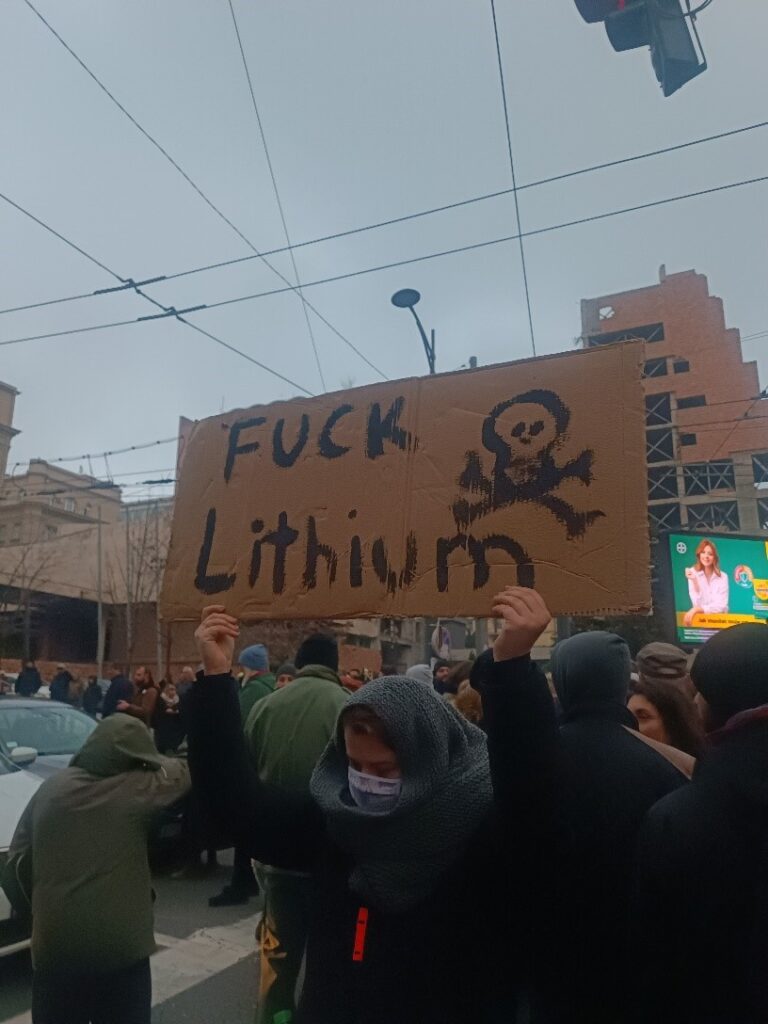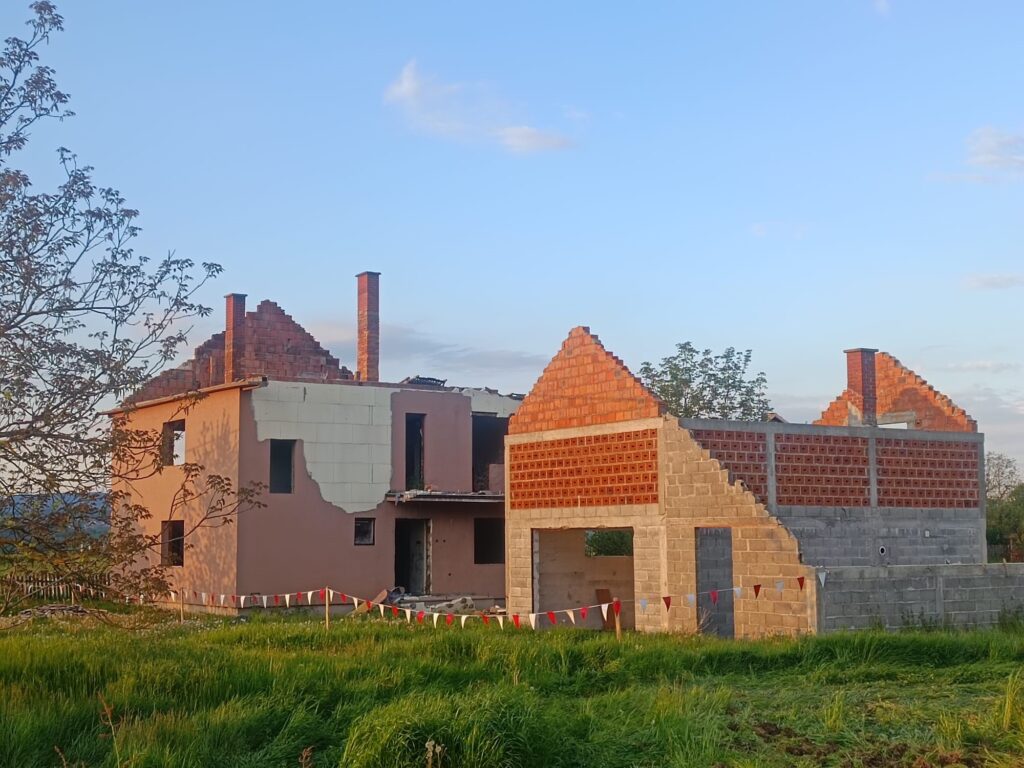By Nina Djukanović
The cancelling of Rio Tinto’s Jadar lithium mine received relatively little attention from international media and academia – wrongly so. By directly challenging the notion of a green future based on extractivism, the movement against lithium mining in Serbia opened up the space for alternative visions of sustainability and marked a significant turning point for the so-called green transition.
From discovery to ongoing resistance
In 2004, Rio Tinto discovered a new mineral jadarite, named after the local river Jadar. Jadarite was found to be exceptionally rich in lithium and with the growing global demand for the element in renewable energy and electric vehicles, this discovery held immense economic promise. By July 2021, Rio Tinto had committed $2.4 billion to develop the Jadar mine and the construction was set to commence in January 2022.
Yet despite being framed as a solution to climate change, the Jadar Project triggered widespread resistance among the local community. Concerns about its environmental impact, pollution and threats to livelihoods of farmers mobilized tens of thousands of people and erupted in protests in over 50 cities, leading to road blockades across the country between November 2021 to January 2022. Taking place just a few months before the presidential, parliamentary, and local elections, the government was forced to succumb to the demands of the protesters and cancelled the mining project in January 2022.
However, just four days after securing re-election in April 2022, Serbian President Aleksandar Vučić stated that he regretted the mining project’s cancellation, referring to it as one of his biggest mistakes. Since the elections, the Serbian governing party SNS along with the President has continuously supported the prospect of lithium mining. Recent investigations confirmed local worries that Rio Tinto spent more than one million euros on buying out Serbian land since the official cancellation of the mining project. The company, the government as well as international actors thus continue to support the lithium mine in Serbia.
SEOS, the “Association of Ecological Organisations of Serbia” (Savez Ekoloških Organizacija Srbije) was formed in October 2021, uniting five local organisations across Serbia who are affected by the prospect of lithium mining. While there are no concrete plans for opening up a mine in the other locations, the SEOS activists are now resisting any possibility of lithium mining, even physically preventing exploration drills. They have continued to organise protests even after the official cancellation, reflecting the uncertainty surrounding the future of the Jadar project and demanding a complete ban on lithium mining as a guarantee that the company will not return.

Blockade of the highway in Belgrade at the height of the protests, December 2021. Photo by Marko Risović.
Green extractivism, green transition and the lithium rush
Green extractivism marks a shift where mining and extraction of raw materials is no longer presented as at odds with environmental protection, but rather is constructed as the primary strategy for tackling climate change. Dominant green transition policies are based on technological fixes that advance economic growth and maintain the consumerist status quo rather than leading to a systemic change.
Technologies such as electric vehicles depend on mining of critical raw materials including lithium, cobalt, copper or nickel. However, as demonstrated by the report of the International Energy Agency, there is a fundamental mismatch between the green policies that are based on mining of critical raw materials, and the availability of the materials needed for such green transition. Moreover, almost 90% of the world’s lithium demand will be coming from electric vehicles by 2050 rather than emphasising the need to decrease the demand for private cars.
Most of the world’s lithium is currently mined in Australia and Latin America, yet China holds a dominant seventy-nine percent share of the global lithium-ion battery (LIB) production market. The EU’s demand for lithium has been intensified by concerns about energy security and sovereignty, as highlighted by the war in Ukraine, which exposed the EU’s reliance on Russia’s oil and gas. The lithium rush thus leads to a new wave of extractivism on European soil, as marked by the EU’s introduction of the Critical Raw Materials Act, which emphasises the need for “local” lithium sources and puts pressure on countries like Portugal and Serbia to open lithium mines.

A protest sign at one of the many protests in front of the Government of Serbia. Photo by author.
Yet the locals of the Jadar Valley struggle to understand how a mine could be more sustainable than their small-scale farming practices based on a deep relationship with the land. “Green are fields, not mines” became a frequently repeated mantra of the local farmers that symbolizes these sentiments and calls for an alternative vision of the “green” future.
Imagining sustainable futures beyond extractivism
The lithium extraction efforts in Serbia have emerged as a pivotal battleground for redefining sustainability, challenging the dominant paradigm rooted in mining and extractivism. As put by one of the local residents in our interview: “There is no such thing as green mining. What is green are fields and leaves because of chlorophyll, that is green.” For those opposing lithium mining in Serbia, the concept of sustainability built upon lithium extraction, endangering both human and environmental well-being in the Jadar Valley, is simply inconceivable and deeply unjust.
This resistance has been intensified by Serbia’s unique position as a semi-periphery, situated within Europe but outside the European Union, amplifying historic sentiments, traumas of wars and colonialism as well as a present sense of becoming a “sacrifice zone.” The protest slogans, “Serbia is not a colony” and “Serbia is not for sale,” echoed these sentiments. In a country where the median salary is around 550 euros, only a few would be able to afford an electric car while the environmental pollution could affect thousands.
Yet in Gornje Nedeljice, the village that has found itself in the centre of the mining project, houses sold to the company, both before and after the project’s cancellation, now stand as eerie reminders of a potential toxic future. Local residents who chose to remain and resist the lithium mine rather than sell their property grapple with the presence of these deserted structures, haunted by the prospect of what could have been and referring to their presence as “psychological war.” Those who refuse to leave the land on which they have been working for generations insist on policies of rural development that support organic farming and invite people to stay or return.

Sold houses in the Jadar Valley are falling apart while the residents who refused to leave are fighting against the mining project. Photo by the author.
Despite the ongoing possibility of the project’s revival, the case presents a noteworthy instance of partially – or at least temporarily – successful resistance to the global extractivist efforts. Opening up new mines across the world is not a solution to climate change while the demand for lithium and other critical raw materials continues to increase dramatically. Rather, the cases such as the one in Serbia urge us to imagine alternative sustainable futures that are truly just both to the human and more-than-human actors.
—
Nina Djukanović is a doctoral researcher at the School of Geography and the Environment, University of Oxford. Her research interests broadly lie within the topics of environmental justice and the contested understandings of sustainability and the green transition.





